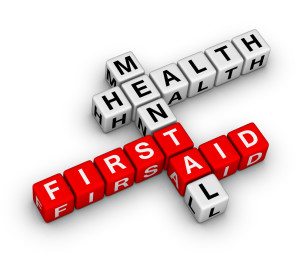Mental Health First Aid Can Be Learned
Lenny Bernstein, a health blogger with the Washington Post, asks a very good question in his article, Trying to Make Mental Health First Aid as Familiar as CPR. After noting most of us would not hesitate to come to the aid of a person suffering from heart attack or other severe medical problem, he asks, “why is it that when we see obvious signs of mental or emotional crisis in a friend, colleague or even a casual acquaintance, our first reaction is to withdraw?”
 At some point, many of us will be in a position to help an individual who is suicidal, depressed, struggling with an addiction, or family problem. At the very least we can ask how they are doing, and listen without judgment. We can also offer to find help or useful information. Knowing you care can make all the difference is some situations, just like CPR can save a life of one in cardiac arrest.
At some point, many of us will be in a position to help an individual who is suicidal, depressed, struggling with an addiction, or family problem. At the very least we can ask how they are doing, and listen without judgment. We can also offer to find help or useful information. Knowing you care can make all the difference is some situations, just like CPR can save a life of one in cardiac arrest.
Those prepared with training in mental health first aid will be in an even better position to help. Bernstein describes the efforts of the National Council for Behavioral Health to train lay people in their 8-hour course, Mental Health First Aid, including its goal of training one million people. Their course teaches participants about risk factors and warning signs of mental health problems like depression, anxiety, trauma, psychosis and addictions; a 5-step approach to helping someone with a mental health problem or in crisis; and helping resources the person can be connected to for help.
Source: Washington Post
If you are not ready to attend an 8-hour course, the following articles will give you a good sense of how you can help someone who is struggling:
What to do When Someone is Suicidal: When someone says he or she is thinking about suicide, or says things sounding as if the person is considering suicide, it can be very upsetting. You may not be sure what to do to help, whether you should take talk of suicide seriously or if your intervention might make the situation worse. Taking action is always the best choice. Read here for what Mayo Clinic says to do.
A Loved One's Substance Abuse Problem: What You Can Do:The best way to start is to learn the facts. There are a lot of misconceptions about drug abuse and addiction. Many people can't understand how anyone could become addicted to drugs and they mistakenly view it as strictly a social problem. Read more about steps you can take to help from the National Institutes of Health (NIH).
Helping a Friend Who is Being Abused: The National Women's Health Information Center, Office on Women's Health offers 12 ways you can help a friend who is being abused: read here.
We Can Help
If you would like additional information on how to help or feel more comfortable applying mental health first aid, VITAL WorkLife consultants are available anytime day or night to discuss any concerns you may have about a family member, friend, co-worker or anyone else who is struggling with mental health problems, addictions or abuse.
Call VITAL WorkLife for the support you and your loved ones need.
- EAP members contact us at 800.383.1908 or through the VITAL WorkLife App
- Physician Well Being Resources members contact us at 877.731.3949 or through the VITAL WorkLife App


